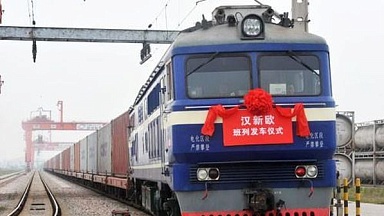Around eight years of planning and consultation preceded the realisation of the Greenport Venlo Rail Terminal. If everything happens according to plan, the first part will become operative in September 2020. At that point, 15 of the 28 hectares will be used. CEO Hans Cabooter hopes to start the construction of the remaining 13 hectares before the end of the year.
When tendering for the assignment, Cabooter was not the only candidate. ECT, which operates two deep-sea terminals on the Maasvlakte, also competed for the exploitation contract. Nevertheless, the Limburgers eventually won the contract.
More than 20 million
The project requires an investment of more than twenty million euros, which the Dutch company pays out of its own pocket. In addition, eleven kilometers of track were constructed around the terminal, for a total of 50 million euros. This money has been raised by the government, the province of Limburg and the municipalities of Venlo and Horst aan de Maas.
The authorities have encouraged the arrival of the terminal to bring about the so-called modal shift. Governments want less and less cargo to be transported by road and more and more via inland shipping, or in the case of the new terminal, by rail. They are also keen to ensure more employment in the Venlo area, a region that has developed into an important logistics hub in recent years.
600,000 TEU per year
Cabooter’s ambition for a new terminal stems from the fact it has ran out of capacity at its current locations in Blerick, Venlo and Kaldenkirchen in Germany. The new site is not a substitute for one or more of the company’s existing terminals, but is intended as an extension to cope with the expected growth in demand. The terminal will have a maximum capacity of 600,000 teu per year. Incidentally, Cabooter is not only aiming at container handling, but certainly also at trailer transport by train.
The new terminal will therefore have eight tracks of nine hundred meters. This length is projected mainly due to the fact that rail transport operators are increasingly looking at the use of longer freight trains of 740 meters. This naturally also requires a longer track.
«This mainly concerns trains to and from Rotterdam,» explains Cabooter. "On that route, the entire infrastructure is prepared for such long trains. But if, for example, you drive to Italy, you will come across bridges and tunnels along the way that cannot handle a 740-meter train and you should rather think of a maximum length of 550 meters. «Nevertheless, Cabooter thought it was worth the extra investment.
Connections
In addition to a connection with Rotterdam, the company also looks to the south of Europe, for example Italy, and to the north, especially Scandinavia. But Cabooter has also dropped its eye on the east of Europe, through a connection with the Hungarian capital Budapest and the Far East.
The company has a terminal in Baku, the capital of Azerbaijan. This must become an important pivotal point, in particular for transport to and from China via the New Silk Road. Cabooter then explicitly thinks of cargo from the e-commerce sector.
«We see that most of the products from web stores are made in China. What we have in mind is that the goods go from China to Kazakhstan and are then transported across the Caspian Sea to Azerbaijan. From there it continues in the direction of Venlo.» Does Cabooter also look at the route that runs through Russia? «We often see boycotts there. That is why we started looking for an alternative route for trade with China.»
Duisburg not happy
The terminal in Venlo is not far from the port of Duisburg. There too, plans were made last year to construct the largest inland terminal in the world, whereby the Germans collaborate with, among others, the Chinese state concern Cosco. This is not a rail terminal, but a trimodal variant. This will be 22 hectares.
The fact that, less than fifty kilometers away, Cabooter has plans to build an even larger terminal could not count on much understanding from the Germans. Duisport has objected to the arrival of the competitor, but this has not been accepted.




